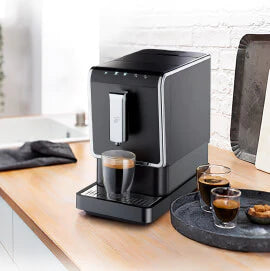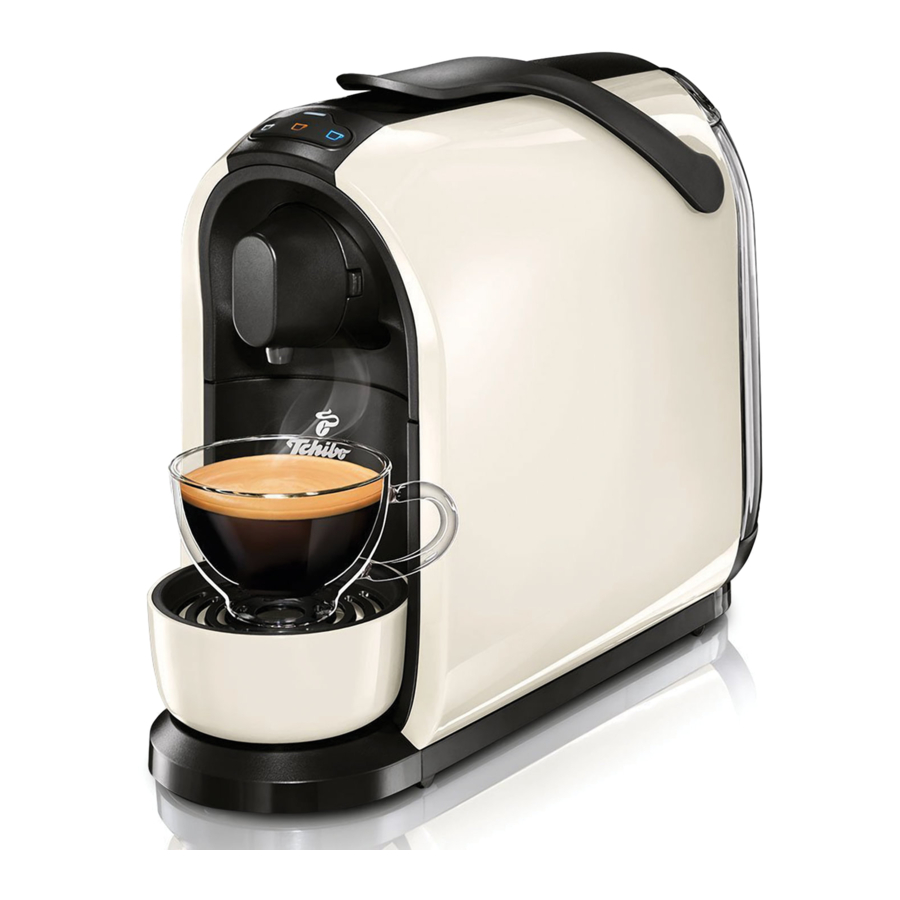Is your Tchibo coffee machine acting up? Don’t worry.
Many common issues have simple fixes. Coffee machines can be finicky. They sometimes refuse to brew, leak, or display error messages. Understanding these problems can save you time and frustration. This guide will help you troubleshoot your Tchibo coffee machine step by step.
With easy-to-follow tips, you can get back to enjoying your coffee in no time. Whether it’s a minor glitch or a bigger issue, we’re here to assist. Read on to learn how to address common Tchibo coffee machine problems effectively. Your perfect cup of coffee is just a few troubleshooting steps away.
Common Issues
Tchibo Coffee Machines are reliable, but sometimes, problems can occur. Below, we will discuss some common issues and how to fix them. Let’s make your coffee experience smooth and enjoyable.
Machine Not Turning On
Is your Tchibo Coffee Machine not turning on? This can be frustrating. Here are some steps to resolve this issue:
- Check the power cord: Ensure it’s properly plugged in.
- Inspect the outlet: Try plugging another device to see if it works.
- Look at the power switch: Make sure it’s in the “on” position.
If the machine still does not turn on, it might be a technical issue. Contact Tchibo customer service for further assistance.
Water Leakage
Water leakage is a common issue with many coffee machines. Here’s how to tackle it:
- Check the water tank: Ensure it is properly seated.
- Examine seals and gaskets: Look for any cracks or damage.
- Inspect the drip tray: Make sure it is empty and correctly positioned.
If you still notice leaks, it might be due to internal damage. In this case, you may need professional help.

Credit: tchibo.us
Error Codes
Tchibo coffee machines are popular for their efficiency and reliability. Yet, they may show error codes from time to time. These codes help identify specific issues with the machine. Understanding these error messages can assist in quick troubleshooting.
Understanding Error Messages
Error messages on Tchibo coffee machines provide valuable information. These messages are usually displayed as codes. Each code corresponds to a specific problem. Here are some common Tchibo error codes and their meanings:
| Error Code | Description |
|---|---|
| E01 | Water tank empty |
| E02 | Coffee grounds container full |
| E03 | Machine needs descaling |
| E04 | Brewing unit jammed |
Resetting The Machine
Sometimes, a simple reset can fix many issues. Follow these steps to reset your Tchibo coffee machine:
- Turn off the machine and unplug it.
- Wait for at least 10 seconds.
- Plug the machine back in.
- Turn it on and check if the error persists.
Important: If the error code reappears, consult the user manual. Further troubleshooting might be required.
Brewing Problems
Brewing problems can ruin your coffee experience. Sometimes, your Tchibo coffee machine may not brew your coffee just right. This section helps you troubleshoot common issues like weak coffee and bitter taste. Let’s dive into these problems and learn how to fix them.
Weak Coffee
If your coffee tastes weak, it can be disappointing. Here are some common reasons:
- Incorrect Coffee-to-Water Ratio: Too much water or too little coffee grounds can result in weak coffee. Ensure you are using the correct amount of coffee grounds for the amount of water.
- Grind Size: If the coffee grounds are too coarse, the water passes through too quickly, resulting in weak coffee. Try using a finer grind.
- Dirty Machine: A buildup of coffee oils and residues can affect the brewing process. Regularly clean your machine to maintain optimal performance.
- Low-Quality Coffee Beans: Low-quality or stale coffee beans can produce weak coffee. Always use fresh, high-quality beans.
Bitter Taste
Bitter coffee can be unpleasant. Here are some reasons why your coffee may taste bitter:
- Over-Extraction: Brewing your coffee for too long can extract bitter compounds. Ensure you are not brewing for too long.
- Water Temperature: Water that is too hot can cause bitterness. The ideal brewing temperature is between 195°F and 205°F (90°C to 96°C).
- Old Coffee Grounds: Stale coffee grounds can result in a bitter taste. Use freshly ground coffee for the best flavor.
- Dirty Machine: A buildup of old coffee residues can also cause bitterness. Regularly clean your machine to avoid this problem.
By addressing these common issues, you can enjoy a perfect cup of coffee every time.
Maintenance Tips
Proper maintenance of your Tchibo coffee machine ensures it runs smoothly. Regular upkeep helps maintain the machine’s efficiency and extends its lifespan. Follow these simple maintenance tips for a perfect cup every time.
Descaling The Machine
Descaling removes mineral buildup inside your coffee machine. Regular descaling is essential to keep your machine functioning well.
- Fill the water tank with a descaling solution.
- Place a container under the coffee spout.
- Start the descaling program as per the machine’s manual.
- Rinse the water tank and fill it with fresh water.
- Run the rinse cycle to remove any descaling residue.
Descale every 2-3 months for best results. This will keep your coffee tasting fresh.
Cleaning The Brew Unit
The brew unit needs regular cleaning to prevent coffee residue buildup. Follow these steps to clean it properly:
- Turn off the machine and unplug it.
- Remove the brew unit carefully.
- Rinse the brew unit under warm water.
- Use a soft brush to clean hard-to-reach areas.
- Let the brew unit air dry completely before reassembling.
Clean the brew unit weekly. This ensures your coffee machine brews smoothly.
Water Supply Issues
Experiencing water supply issues with your Tchibo coffee machine can be frustrating. These problems might affect your coffee’s quality. Below, we address common water supply issues and how to troubleshoot them.
Low Water Pressure
Low water pressure can prevent your coffee machine from working properly. First, check if the water tank is full. An empty tank often causes low pressure.
Next, inspect the water filter. A clogged filter can restrict water flow. Replace the filter if necessary. Lastly, ensure the water line is not kinked or blocked. Straighten or clean it to restore normal pressure.
Water Not Dispensing
If your machine is not dispensing water, start by checking the water tank. Ensure it is properly seated and filled. A loose tank may cause dispensing issues.
Check the water pump for any signs of damage. A faulty pump may need replacement. Also, look at the machine’s nozzles. Clean them if they are clogged. This should help the water dispense correctly.
By addressing these common issues, you can keep your Tchibo coffee machine running smoothly. Enjoy your perfect cup of coffee every time.
Grinder Problems
Experiencing issues with your Tchibo coffee machine grinder can be frustrating. The grinder is a key part of the machine. It ensures your coffee beans are ground to perfection. Understanding common grinder problems can help you fix them quickly. This guide will cover some typical grinder issues.
Grinder Not Working
If your grinder is not working, first check the power. Ensure the machine is plugged in. Look at the power switch. Make sure it is turned on.
Next, see if the coffee beans are stuck. Remove any beans that are blocking the grinder. Clean the grinder chamber. Use a soft brush to remove debris.
If the grinder still does not work, inspect the burrs. They may be worn out. Burrs are the parts that grind the coffee beans. Replace the burrs if needed.
Adjusting Grind Size
You may need to adjust the grind size. Different coffee types need different grind sizes. For espresso, use a fine grind. For drip coffee, use a medium grind. For French press, use a coarse grind.
To adjust the grind size, use the grinder settings. Most Tchibo machines have a dial or button. Turn the dial or press the button. Set it to the desired grind size.
Make a small batch of coffee. Test the grind size. Adjust again if needed. Repeat until you achieve the perfect grind.
Frother Malfunctions
Experiencing issues with your Tchibo coffee machine frother can be frustrating. Whether your milk isn’t frothing or the frother needs a good cleaning, troubleshooting these problems is essential. Below are some common frother malfunctions and how to address them.
Milk Not Frothing
If your milk isn’t frothing, check the milk type. Use cold, fresh milk for best results. Whole milk froths better than skim or low-fat milk. Ensure the milk container is clean. Dirty containers can affect frothing.
Also, check the steam wand. Make sure it is securely attached. Loose attachments can cause frothing problems. If the steam wand has residue, clean it. Residue can block steam flow.
Cleaning The Frother
Cleaning the frother regularly is crucial. First, turn off the machine. Wait for it to cool down. Remove the frother parts carefully. Soak them in warm, soapy water.
Use a soft brush to clean the parts. Avoid using harsh chemicals. Rinse thoroughly with clean water. Dry the parts completely before reassembling.
For the steam wand, wipe it with a damp cloth after each use. This prevents milk residue buildup. Deep clean the steam wand weekly. Use a needle to clear any blockages in the nozzle.
Regular cleaning ensures your frother works efficiently. It also prolongs the machine’s lifespan.

Credit: www.manualslib.com
Customer Support
Encountering issues with your Tchibo coffee machine can be frustrating. Luckily, Tchibo offers reliable customer support to help you resolve these issues. In this section, you will find essential information about warranty and how to contact Tchibo support.
Warranty Information
Understanding your coffee machine’s warranty is crucial. Tchibo provides a comprehensive warranty for their coffee machines.
- Duration: Typically, Tchibo offers a one-year warranty.
- Coverage: The warranty covers manufacturing defects and certain parts.
- Exclusions: Normal wear and tear, misuse, or accidental damage are not covered.
Always keep your proof of purchase handy. You may need it to claim the warranty.
Contacting Tchibo Support
If your issue persists, contacting Tchibo support is your best option. They can provide expert assistance and guide you through the troubleshooting process.
Here are the ways you can reach out to Tchibo support:
- Phone: Call their customer service hotline for immediate assistance.
- Email: Send a detailed email with your issue and machine details.
- Online Form: Fill out the support form on Tchibo’s website.
Make sure to provide all necessary details, including the model number and a description of the issue. This will help the support team assist you more efficiently.

Credit: www.youtube.com
Frequently Asked Questions
Why Is My Tchibo Coffee Machine Not Brewing?
Check if the water tank is filled and properly inserted. Clean the machine’s filter and check for clogs.
How Do I Descale My Tchibo Coffee Machine?
Mix descaling solution with water. Run the solution through the machine. Rinse with clean water.
Why Is My Tchibo Coffee Machine Leaking Water?
Check the water tank and seals for damage. Ensure all parts are correctly assembled.
How Often Should I Clean My Tchibo Coffee Machine?
Clean after every use. Descale every 3 months or as per the user manual.
What Do I Do If The Coffee Tastes Weak?
Ensure coffee grounds are fresh. Check the grind size and amount used. Adjust machine settings if needed.
Conclusion
Fixing your Tchibo coffee machine can be easy. Follow the steps above. Regular maintenance helps keep it running smoothly. Remember to clean and descale frequently. This prevents many common issues. Always use fresh coffee beans for the best taste. If problems persist, contact customer support for help.
Enjoy your perfect cup of coffee every day!
